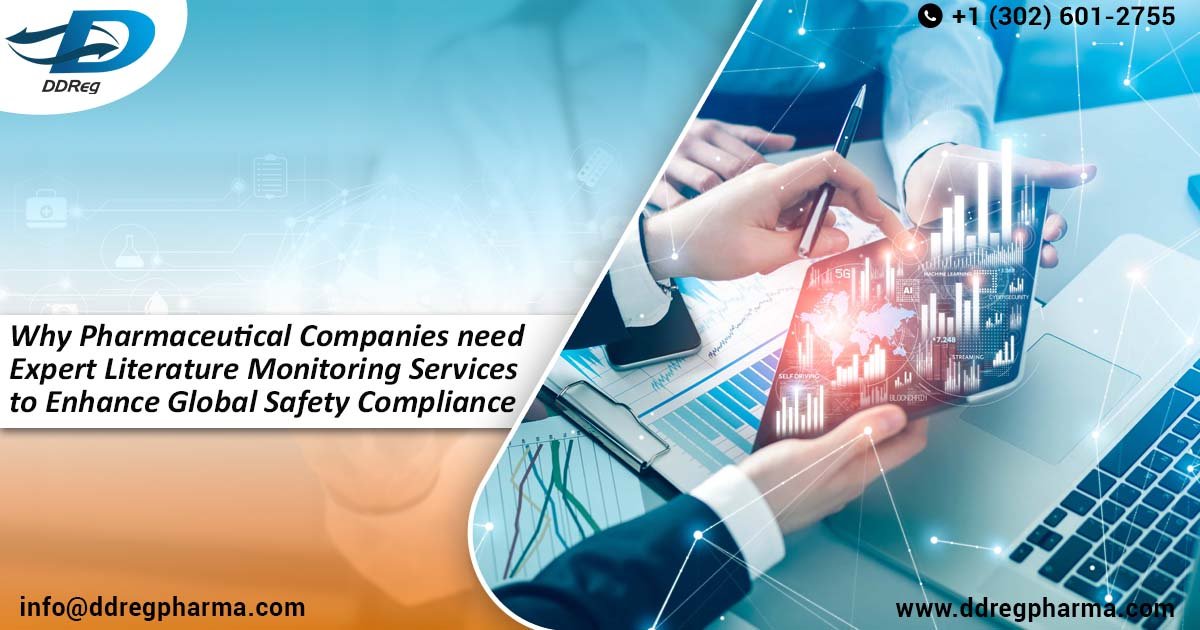Pharmaceutical companies operate in one of the most highly regulated industries in the world, facing constant scrutiny from health authorities and the public. Safety and compliance are not just regulatory necessities but vital aspects of protecting public health and maintaining a trusted industry reputation. With global markets expanding and the regulatory landscape continually evolving, the need for expert literature monitoring services has become more pressing than ever.
In this blog post, we’ll explore why pharmaceutical companies benefit from specialized literature monitoring and how these services help ensure safety compliance across international markets.
What is Literature Monitoring in the Pharmaceutical Industry?
Literature monitoring involves the systematic search, analysis, and documentation of scientific and medical literature to identify any relevant information on the safety, efficacy, and quality of drugs. Pharmaceutical companies must regularly monitor a broad array of sources, including medical journals, databases, regulatory updates, case studies, and more.
When managed effectively, literature monitoring can support pharmacovigilance, signal detection, risk management, and compliance with local and international regulatory requirements. This process becomes especially crucial in a global context, where varying regulatory standards and safety concerns necessitate ongoing vigilance.
Growing Demand for Expert Literature Monitoring Services
As pharmaceutical companies expand their reach across borders, they must stay compliant with the regulations in every market they serve. Here’s why expert literature monitoring services are essential in today’s global pharmaceutical landscape:
- Increasing Volume and Complexity of Data With the explosion of digital publications and research, pharmaceutical companies now face an overwhelming amount of data. Expert literature monitoring services streamline this information, identifying essential safety signals and trends that impact product safety profiles.
- Varying Global Regulatory Requirements Regulatory authorities worldwide, like the FDA, EMA, MHRA, and PMDA, have different requirements for safety compliance. Professional literature monitoring ensures compliance with these diverse standards, reducing the risk of non-compliance penalties and protecting companies’ reputations.
- Enhanced Pharmacovigilance Capabilities Pharmacovigilance is critical for detecting, assessing, and understanding adverse effects associated with drugs. Literature monitoring services help gather and interpret data that can identify new adverse events, understand risk factors, and ultimately improve patient safety.
- Efficiency and Resource Optimization Keeping up with literature monitoring demands significant resources. Expert services can optimize time and costs for pharmaceutical companies by providing dedicated professionals who focus solely on literature monitoring and compliance.
- Proactive Risk Management Literature monitoring helps pharmaceutical companies identify potential safety issues early, allowing for proactive risk management. This proactive approach can significantly reduce the risk of drug recalls, costly lawsuits, or safety scandals.
Benefits of Using Expert Literature Monitoring Services
Let’s take a closer look at the advantages that pharmaceutical companies gain from employing specialized literature monitoring services:
Comprehensive and Systematic Data Coverage
Literature monitoring services have access to extensive databases and networks of medical journals, research studies, and industry publications. By utilizing these services, companies can ensure they’re monitoring all relevant sources, minimizing the chance of missing critical safety data.
Expertise in Identifying Relevant Safety Signals
Experienced literature monitors can discern crucial safety signals and trends amidst vast data, often identifying potential issues that might otherwise go unnoticed. This expertise is invaluable, as early detection of adverse events or safety risks can prompt timely action and mitigate further risks.
Real-Time Monitoring and Reporting
Staying updated on newly published literature is crucial for prompt safety response and compliance. Expert monitoring services offer real-time updates and custom alerts, ensuring pharmaceutical companies are immediately informed of any developments that could impact product safety.
Improved Regulatory Reporting and Documentation
Accurate and comprehensive documentation is essential for regulatory compliance. Literature monitoring services provide structured reporting to help pharmaceutical companies meet the various requirements of regulatory agencies. Their documentation can also serve as vital evidence during safety audits or investigations.
Language and Regional Expertise
Global markets involve language and cultural diversity, which can complicate literature monitoring. Professional services have experts who understand the nuances of local languages and regulatory contexts, helping pharmaceutical companies maintain compliance across different regions.
Conclusion:
As global safety regulations tighten and drug safety becomes increasingly scrutinized, pharmaceutical companies must prioritize robust, proactive literature monitoring.Medical Card. The investment in expert literature monitoring services offers benefits far beyond compliance—enhancing pharmacovigilance, protecting patient safety, and safeguarding a company’s reputation.



